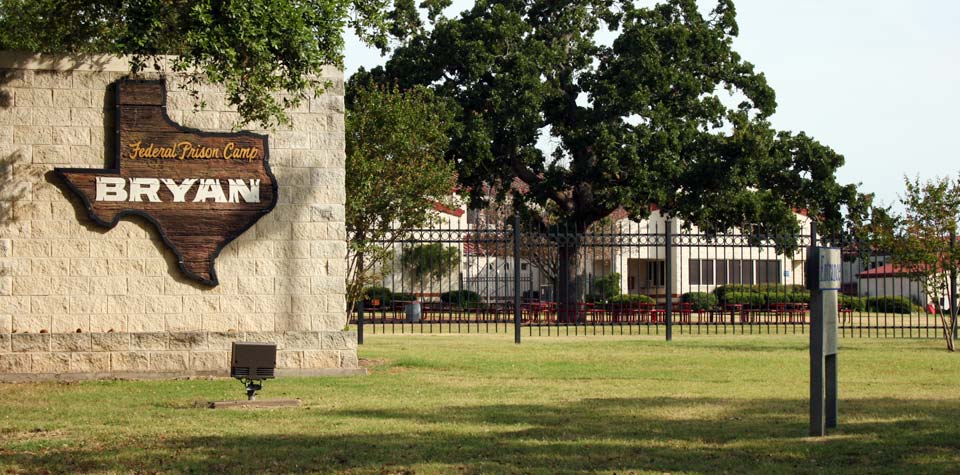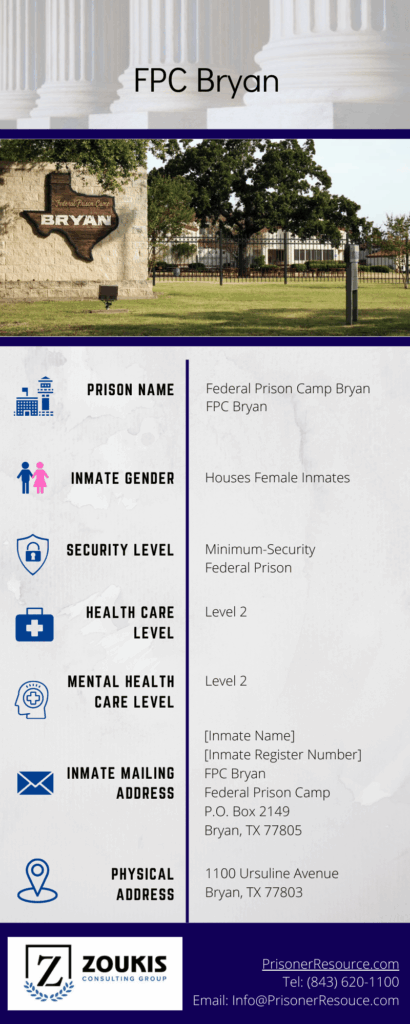Federal Prison Camp Bryan is a minimum-security federal prison located in Bryan, Texas. It is also known as FPC Bryan and the women’s prison Bryan, Texas. The facility houses female inmates.
FPC Bryan Contact Information
Facility Address & Contact Information
Federal Prison Camp Bryan
1100 Ursuline Avenue
Bryan, TX 77803
Phone: 979-823-1879
Fax: 979-821-3316
Email: [email protected]
BOP Website: Bureau of Prisons Page
Wikipedia: Wikipedia Page
Inmate Correspondence Address
FPC Bryan
Inmate Name and Registration Number
FPC Bryan
Federal Prison Camp
P.O. Box 2149
Bryan, TX 77805
How to Send Money
Do not send money to an inmate at Bryan Federal Prison Camp. See our page on sending money to federal prisoners.
Federal Prison Camp Bryan Inmate Information
Inmate Gender
Female Inmates
Prison Security Level
Minimum-Security Federal Prison
Facility Location
FPC Bryan is located 95 miles northwest of Houston and 165 miles south of Dallas, in the town of Bryan at the intersection of Ursuline Avenue and 23rd Street.
BOP Region
BOP Institution Code
BRY for FPC Bryan
Medical Care Level
Level 2. See our page on Medical Care Levels and Procedures for more information.
Mental Health Care Level
Level 2.
Judicial District
Population Number
FPC Bryan houses approximately 515 inmates.
FPC Bryan Prison Services Information

Background
Federal Prison Camp Bryan is a minimum-security federal women’s prison in Bryan, Texas, which houses female inmates. It was opened in 1989.
The facility partners with Canine Companions for Independence to allow inmates to train dogs to become personal assistance dogs.
Notable inmates include former Commissioner of Hidalgo County (TX) Sylvia Handy (convicted of hiring illegal aliens as county employees and personal caretakers and then stealing their earnings to pay for personal expenses) and Ruby Jane McMillian (convicted of conspiracy as part of a methamphetamine distribution ring).
Media reports indicate that there have been at least three escapes at the institution and that at least seven female inmates have been sexually assaulted by prison guards.
In 2017, Insider Monkey named Bryan federal prison camp in Bryan, Texas, as one of the ten easiest federal prisons to do time.
Inmate Housing
Inmates are housed in four-person rooms. There are approximately 200 inmates per dormitory.
Health Services
Health services provided at FPC Bryan include sick calls, emergency health treatment, medications, physical examinations, chronic care, HIV testing, dental services, and initial screening. Emergency medical care is available 24 hours a day. Routine care is obtained by attending the sick call.
Psychology Services
Bryan, Texas federal prison provides various psychological services, including:
- Screening/Assessment
- Drug Education
- Individual/Group Counseling
- Psycho-Educational Classes
- Self-Help/Supportive Services
- Medications
Brief counseling and long-term therapy are also available. Medication monitoring and evaluation for medication referral are available. Mental health programs designed to help inmates with severe emotional, cognitive, and behavioral problems are available for inmates who are having difficulty functioning in a mainline institution due to a psychological disorder. The STAGES Program for inmates with serious mental illness and personality disorders is also offered.
Residential Drug Abuse Program (RDAP)
FPC Bryan has the Residential Drug Abuse Program (RDAP). It also provides a drug abuse program, Drug Abuse Education Course, and the Non-Residential Drug Abuse Program (NR-DAP).
FPC Bryan Educational, Library, and Recreation Offerings
Education Services
FPC Bryan provides literacy, GED, English-as-a-Second Language (ESL), Adult Continuing Education (ACE) courses, and parenting classes. Hours of operation are 7:30 to 10:30 a.m., 12:40 to 3:30 p.m., and 5:30 to 8:30 p.m. Incentive awards are provided to inmates making satisfactory progress and successfully completing the literacy programs. Inmates may also receive incentives for progressing to various levels in the GED or ESL programs. Graduation ceremonies recognize GED, ESL, and Occupational Education completions. High school diplomas and post-secondary degrees are available through paid correspondence programs. Blinn College also offers inmates on-site classes.
Advanced Occupational Education
FPC Bryan offers advanced occupational education in:
- Accounting Technology
- Administrative Assistant Specialist
- Cosmetologist
- HVAC
- Horticulture
- Medical Transcription/Coding Specialist
- Microsoft-Business Applications
- Small Business Management.
Vocational Training
FPC Bryan does not offer vocational training programs aside from advanced occupational education programs.
Apprenticeship
No apprenticeship training programs are currently available at the federal women’s prison in Bryan, Texas, aside from the advanced occupational education programs.
Library Services
FPC Bryan offers both leisure and law libraries. The leisure library offers inmates a variety of reading materials, including periodicals, newspapers, fiction, nonfiction, and reference books. An interlibrary loan program is available. The TRULINCS Electronic Law Library provides inmates with access to legal materials and an opportunity to prepare legal documents. A copy machine and electric typewriters are also available for inmate usage.
UNICOR
The FPC Bryan UNICOR faculty is a call center.
Commissary
Inmates are allowed to spend $360.00 monthly in the commissary on their assigned shopping days. Inmates may use funds in their account to purchase items at the institution commissary, place funds on their inmate phone account, purchase TRU-Units for their TRULINCS account or send funds out of the institution using Form BP-199. Often inmates carry their purchases in laundry bags back to their housing unit.
Recreation Services
Leisure activities at FPC Bryan include:
- Organized and informal games
- Sports
- Physical Fitness
- Table Games
- Hobby Crafts
- Music Programs
- Intramural Activities
- Social/Cultural Organizations
- Movies
Art and hobby craft programs, wellness programs, and other recreation programs are also available. Indoors, inmates will find treadmills, ellipticals, Stairmasters, and various weights. Outdoors, inmates can participate in softball, volleyball, weightlifting, yoga, Pilates, and the Jumpstart weight loss program. Picnic tables, bleachers, and TVs are also available. Hours of operation are 6:00 a.m. to 8:30 p.m., excluding count times and recall for the noon meal.
Visitation Information for FPC Bryan
On Saturdays and Sundays, visiting hours are between 8:00 a.m. and 5:00 p.m. On federal holidays visiting hours are between 8:00 a.m. and 3:00 p.m. See our page on prisoner visitation rules for more information.

FPC Bryan Prison Culture Information
Prison Politics at Federal Prison Camp Bryan
Because FPC Bryan is a Camp, there are virtually no prison politics.
Level of Violence
There is almost no violence. One inmate stated that the institution is “very safe” and that there “very rarely is there an altercation.”
Vulnerable Populations
While sex offenders are barred from Camp placement, informants and LGBT federal inmates don’t have any problems walking this yard.
Good at FPC Bryan
“The programs offered and the opportunity to better yourself.”
Bad at FPC Bryan
“The pettiness and the lack of professionalism of a few staff members.”
Other Inmate Comments
“Stepping down from an FCI, here you have many more rights, but also many more rules.” “As long as you do the right things in here, this place is easy. There are always worse places to bid your time.”
FPC Bryan in the News
In May 2017, three women — Edith Lara, Ysenia Frausto, and Brenda Rosas — escaped from the Federal women’s prison in Bryan, Texas. Frausto was picked up by the U.S. Marshals two days later.
In July 2016, James Graves, a guard at FPC Bryan, was sentenced to 21 months in prison for engaging in sexual contact with two female prisoners.
In May 2016, Kendrick Desmond Brooks, an employee at FPC Bryan, was sentenced to six months for having sex with female prisoners.
In April 2016, Deputy Attorney General Sally Yates visited FPC Bryan as part of National Reentry Week, designed to highlight the necessity of successful reintegration back into society.
Also in April 2016, Marshall Thomas, a guard at Bryan Federal Prison Camp in Bryan, Texas, was sentenced to 18 months in prison and required to register as a sex offender after admitting to forcible intercourse with a female prisoner and vaginal penetration with his fingers of another prisoner in July 2014.
In April 2010, Canine Companions for Independence began operating a program at FPC Bryan to train puppies the skills to become assistance dogs.
In 1998, Charles Keith Alexander, a cook supervisor at FPC Bryan, was indicted on nine misdemeanor charges after sexually assaulting four female prisoners over a two-year period.
More Information About Federal Prison Camp Bryan
For a comprehensive look at life in federal prison, pick up a copy of Christopher Zoukis’ Federal Prison Handbook: The Definitive Guide to Surviving the Federal Bureau of Prisons. For more detailed information about FPC Bryan, please buy a copy of the Directory of Federal Prisons: The Unofficial Guide to Bureau of Prisons Institutions by Christopher Zoukis.
Contact Elizabeth Franklin-Best P.C. at (843) 620-1100 or contact us today to speak with a federal criminal defense attorney and take decisive action to protect your rights.
